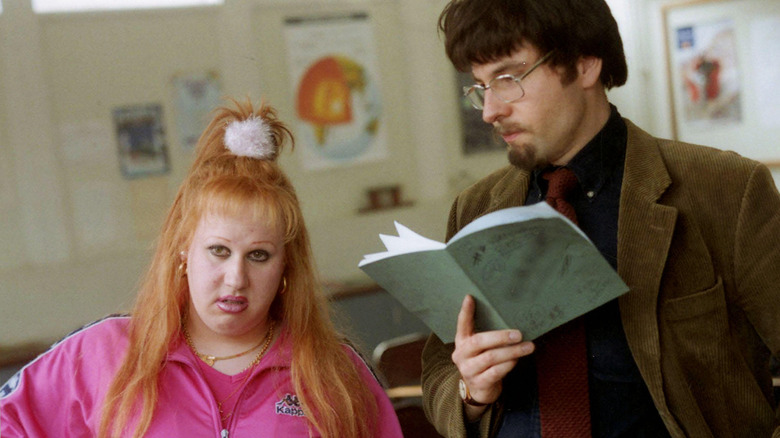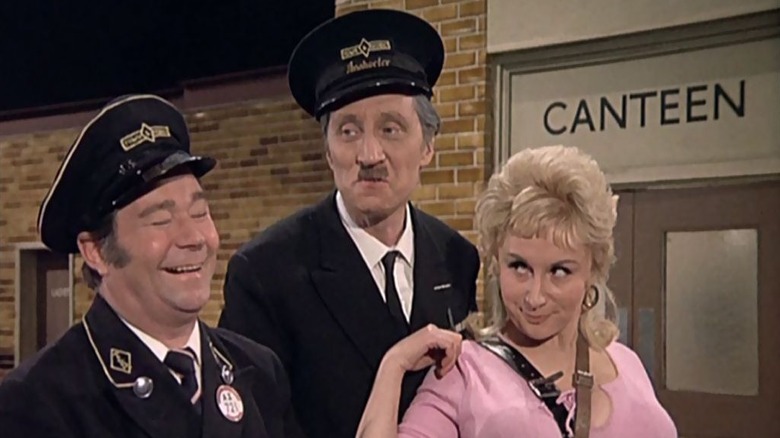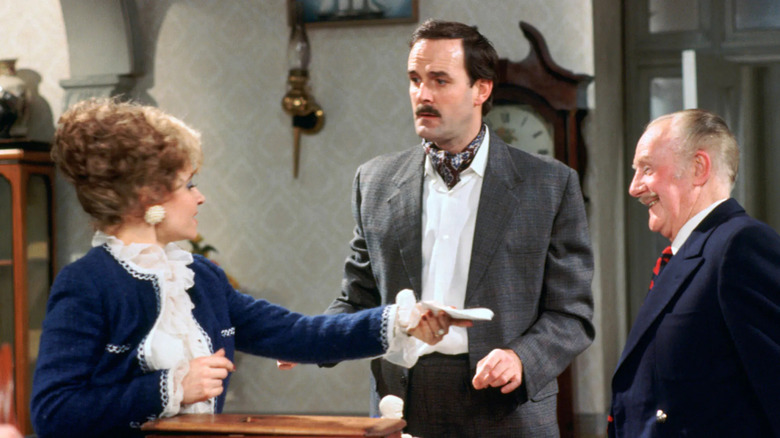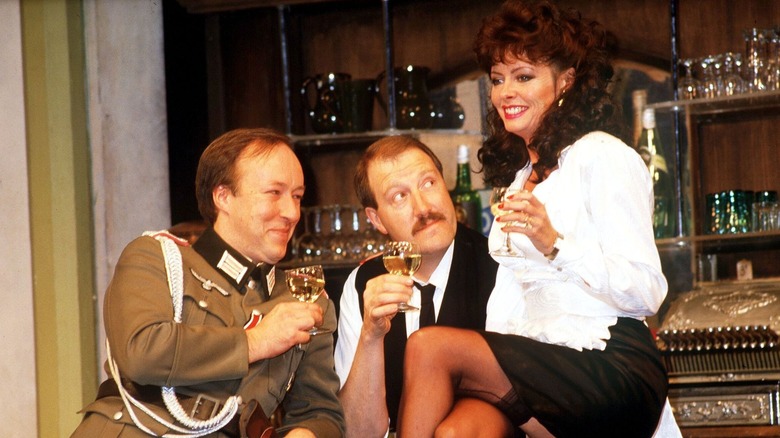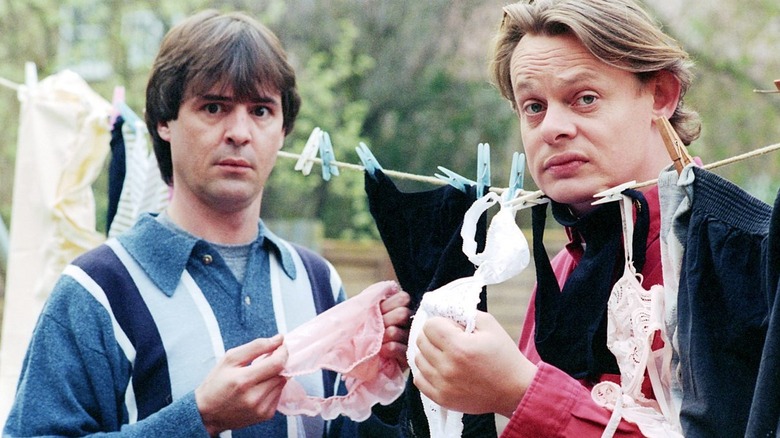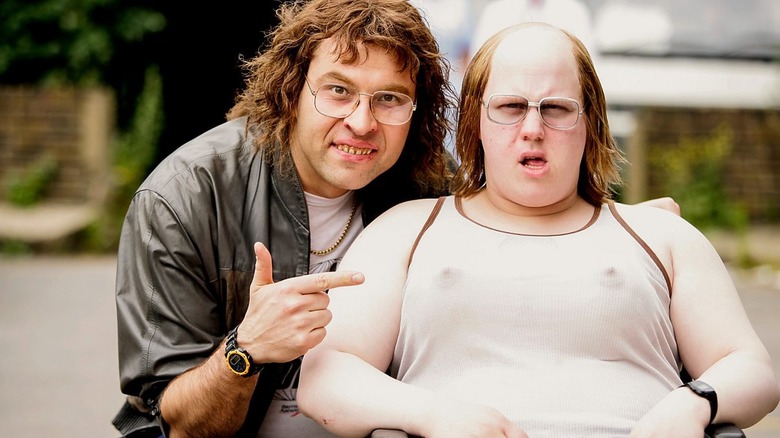5 British Sitcoms That Haven't Aged Well
When I first moved from England to Czechia in 2009, I always turned to comedy when I felt a little homesick. Maybe it was because watching TV was such a shared experience when I was growing up in the 1980s and '90s, and some of my warmest telly-related memories was sitting around the box with the whole family, howling with laughter at a favorite sitcom. So, I was always grateful when my nan would send over bundles of DVDs that came free with her newspaper, usually double-bills of classic shows like "Porridge," "One Foot in the Grave," and "Some Mothers Do 'Ave 'Em." The blurb on the cardboard sleeve would often refer to them as "timeless classics," but comedy arguably dates quicker than any other genre, and some old favorites are more timeless than others.
I was thinking about this recently when I was writing a piece about "All in the Family" and its British predecessor, "Till Death Do Us Part." The latter first aired in the 1960s and early episodes look incredibly ancient, but, if you upgraded the setting and a few of the topical references, much of the writing would be just as relevant today. The show was always controversial, but satire tends to age well, presumably because absurd human behavior hasn't changed all that much over the past several centuries. However, thanks to the bigoted views and racist slurs used by its main character, "Till Death Do Us Part" is one of those shows that often comes up in the endless debate about what would and wouldn't play nowadays. Some nostalgic viewers blame political correctness and pine for a bygone era when people could "take a joke," which is often code for laughing at women, queer folk, and people of color.
The fact is that what was acceptable to the broader British public 50, 40, or 30 years ago often changes over time, and even more evergreen classics like "Only Fools and Horses" contain some language and stereotypes that are questionable to the present-day viewer. Another factor is that some beloved sitcoms date badly because the style of comedy seems archaic after a few decades. Here are five popular shows that haven't aged well.
On the Buses (1969 - 1973)
I don't know if it is fair to say "On the Buses" is outdated, because it's not clear if it was ever in date. Its dreary, low art comedy always felt like a rip-off of the "Carry On" films, which at least had the likes of Kenneth Williams, Sid James, and Charles Hawtrey wringing laughs out of even the weakest material. The show followed the antics of bus driver Stan Butler (Reg Varney) and his slacker conductor and best mate Jack Harper (Bob Grant), two unappealing middle-aged men who spent every episode trying to "get their leg over" with the young women working at the bus depot and tormenting their long-suffering supervisor, Inspector Cyril "Blakey" Blake (Stephen Morris). We also spent time in the nightmare scenario at Stan's house, where he lived with his stereotypical battleaxe mother (Cicely Courtneidge/Doris Hare), his sister Olive (Anna Karen), and her grumpy husband Arthur (Michael Robbins).
The set-ups were tiresome and predictable, with the young women inexplicably flattered by Stan and Jack's lecherous approaches and Blakey inevitably responding to the latest humiliation with a wail of "I'll get you for this, Butler!" In fairness to Robbins, the actor managed to get plenty of mileage out of the miserable old jobsworth and even got his own spin-off show called "Don't Drink the Water" (which ran from 1974 to 1975). Ultimately, "On the Buses" trundled along on smutty humor, racism (Glenn Whitter played a Black character nicknamed "Chalkie"), and casual sexism, which was par for the course in many comedy shows from the era. However, there is something dispiriting about the gleeful cruelty of it, with a nasty streak of misogyny prevailing throughout. A typical gag might involve the boys spiking the tea of women they deem unattractive with laxatives, and Olive was routinely bullied by Stan and Arthur about her appearance. To top it all off, the series has such a grotty appearance — if any British sitcom looks like it has bad breath, this is it.
"On the Buses" was very popular in its day, spanning seven seasons in four years, three successful movies, and a morbid re-run afterlife. It even made it across the pond for a Stateside remake titled "Lotsa Luck" and starring Dom DeLuise. All the same, it paints a grim picture of British humor in the 1970s — one that belongs in the dustbin alongside other insensitive and laugh-free sitcoms like "Love Thy Neighbor" and "Man About the House."
Fawlty Towers (1975 - 1979)
I know this pick will be sacrilegious for many comedy lovers because "Fawlty Towers" is still regularly ranked as one of the best British sitcoms of all time, and it still holds a special place in the hearts of many. I can understand that, because the show is centered around John Cleese's Basil Fawlty, a character who follows in the great British comedy tradition of frustrated little men (figuratively speaking, in this case, as Cleese is 6 feet 5 inches tall) with ideas above his station. In that respect, it makes for great class comedy as the irascible hotel owner fawns over guests that he thinks are worthy and berates those he believes are beneath him. It's just the rest of the series around him looks very long in the tooth, and it makes me cringe out of my skin today, and not in a good way.
I'm not talking about the 2020 controversy when one episode ("The Germans") was axed from a British streaming service due to one elderly character's use of racial slurs, thus depriving nostalgic viewers the pleasure of Basil verbally abusing a group of German tourists. The episode is famous for Basil insisting "don't mention the war" before wildly goose-stepping through the hotel, which apparently still goes down very well in Germany. I'm also not talking about another episode's stereotypical portrait of the Irish as shifty and unmotivated or Andrew Sachs shamelessly mugging his way through every episode as Basil's groveling Spanish waiter Manuel. I get all that stuff was (and still does) expose the outdated attitudes and prejudices of a certain type of Little Englander.
What grates on my nerves is the whole format of "Fawlty Towers." John Cleese and his then-wife Connie Booth (who played Polly in the show) only wrote 12 episodes and each one is basically the same, relying far too much on creaky farce and labored misunderstandings. Beyond the classic bits that everyone remembers, it's mostly Basil frantically dashing in and out of rooms, yelling at people, slapping Manuel around, and veering close to total meltdown. Cleese's performance is a physical tour de force, but it is very one-note and bloody exhausting to watch nowadays when we're used to more nuanced cringe. I guess we might say that Basil goose-stepped so more modern giants like Alan Partridge and Steve Coogan could run.
'Allo 'Allo! (1982 - 1992)
In his book "The English: A Portrait of a People," Jeremy Paxman argued that the English are so obsessed with World War II because it was the last time we shared a common purpose and sense of identity. As a result, sitcoms set during the conflict are an enduring sub-genre of 20th Century British comedy, from the beloved antics of "Dad's Army" and the problematic stereotypes of "It Ain't Half Hot Mum" to the time-hopping romantic complications in "Goodnight Sweetheart." The less said about "Heil Honey I'm Home!" (the spoof sitcom about Adolf Hitler and Eva Braun that was canceled after one episode), the better.
"'Allo 'Allo!" is far less offensive but no less baffling. The long-running bawdy comedy is set in occupied France during World War II and centers on René Artois (Gordon Kaye), a henpecked cafe owner who finds himself juggling extra-marital flings with raunchy waitresses, his reluctant involvement with the French Resistance, sheltering a pair of British airmen, and glad-handing the various Nazi officials who frequent his establishment. Away from the cafe, the series also visits the dungeon headquarters of Gestapo agent Herr Flick (Richard Gibson/David Janson) and his secretary Helga (Kim Hartman), who regularly attempts to seduce her boss by stripping down to her lingerie.
Set up as a spoof of the BBC's forgotten wartime drama "Secret Army," "'Allo 'Allo!" started out broad and got steadily broader over a remarkable 10-year run when it became one of the most popular shows on BBC One. Along the way, it became a case study in just about every old-fashioned form of British comedy since the war: Bedroom farce (René's irresistibility to young women); funny foreigners and their outrageous accents ("Listen vary carfully, I shall say zis only vonce!"); camp innuendo (one German officer also had a big crush on René); mother-in-law jokes; and saucy postcard humor (the ongoing quest for a stolen artwork called "The Fallen Madonna with the Big Boobies").
In truth, the show hasn't aged as much visually as certain other sitcoms from the '80s thanks to its period setting, and you have to admire everyone's commitment to their shtick. But even at the height of its popularity I thought "Allo 'Allo!" felt incredibly dated, and it's probably safe to say it wouldn't get made today. It's still popular in Britain and in Europe, and the surviving cast members were "greeted like the Beatles" in Bulgaria during a visit in 2017.
Men Behaving Badly (1992 - 1998)
Two blokes, one sofa, many cans of lager: That was the basic setup for "Men Behaving Badly," the hugely popular '90s show that became an unreconstructed celebration of arrested development, oafish behavior, and non-PC banter with your mates. It struck a chord against a backdrop of Britpop, Cool Britannia, and lad culture; If you're not familiar with the latter term, it was all about footy, beer, men's lifestyle magazines like Loaded and FHM, jetting off to Ibiza for a two-week party, and generally "having it large." Girls could get in on the act, too; you also had "ladettes" or young women who took pride in showing that they could act crudely and down a pint just as well as the boys. As such, "Men Behaving Badly" was one of the defining sitcoms of the decade and regularly pulled in over 10 million viewers at its peak.
"Men Behaving Badly" started off on ITV (the third of Britain's terrestrial channels back then) with Martin Clunes and Harry Enfield playing Gary and Dermot, a pair of 30-something flatmates living in London. Meanwhile, Caroline Quentin and Leslie Ash played Dorothy and Deborah, the two more responsible women living upstairs. The first season was moderately successful, but it only really took off when it switched to the BBC instead, and Enfield dropped out. He was replaced by Neil Morrissey as the work-shy womanizer Tony, who had far better chemistry with Clunes. Crucially, a later time slot on the Beeb also enabled the series' writers to indulge in more risqué material, which helped it become the channel's hottest show.
Most episodes usually involved Gary and Tony hanging around the flat, chugging beer and getting into drunken shenanigans while talking about women and their sex lives in a boorish way. This drew criticisms of sexism, but the more problematic aspect was Tony's lust for Deborah. At times, he was basically a stalker, spying on her and stealing her panties. It was all played for laughs, of course, and the men were often put in their place by the women. But it plays very uncomfortably today, and Quentin has since said the show was "past its sell by date" come the final season in 1998. "Men Behaving Badly" is pretty well written and performed by its four leads, but it feels like a sitcom that could have only achieved such amazing success in the mid-'90s.
Little Britain (2003 - 2006)
"Little Britain" is more of a sketch show than a sitcom, but I'm including it because it is one of the most polarizing British series of the 21st Century. Some people still regard it as comedy gold, while others find it deeply unfunny and mean-spirited — I fall into the latter category, although I was onboard at first when it graduated from radio to BBC Three. Back then, it was a small irreverent show ostensibly about the idiosyncrasies of British life, with a bunch of quirky characters played by its creators, David Walliams and Matt Lucas.
The boys got mighty high on their own supply when it moved to BBC One and became a monster hit. You simply couldn't avoid it for a few years in the noughties, and it became increasingly reliant on catchphrase-based comedy. This switch revealed the thinness of the material and, worse still, the cruelty of it. The bigger it got, the more "Little Britain" punched down with its gross caricatures as well. Fat shaming, poverty shaming, disablism, homophobia, and racial stereotypes were all played at an excruciatingly loud pitch.
Examples of the "comedy" on display include Marjorie Dawes (Lucas), the leader of a weight loss group who relentlessly abused the other members about their size; Emily Howard (Walliams), a cross-dresser whose catchphrase was shrieking "I'm a lady!"; Ting Tong (Lucas), a Thai mail-order bride; and Vicky Pollard (Lucas), a typical chav from a council estate with "six babies from seven different blokes." Perhaps the most grotesque was Bubbles DeVere, played by Lucas in a fat suit. The whole purpose of that skit was Bubbles getting naked so we could laugh at her obese body.
A backlash against "cancel culture" inevitably blew up in 2020 when "Little Britain" was pulled from Netflix and other U.K. streaming services. In all honesty, it beggars belief that the BBC found it acceptable in the first place; the show always look like something that would be more at home in the early 1970s than the beginning of the 21st Century. Walliams and Lucas followed up their success with "Come Fly with Me" in 2010, which was arguably even more insensitive with its racial stereotypes and use of blackface and brownface. Luckily, that only lasted for one season.
